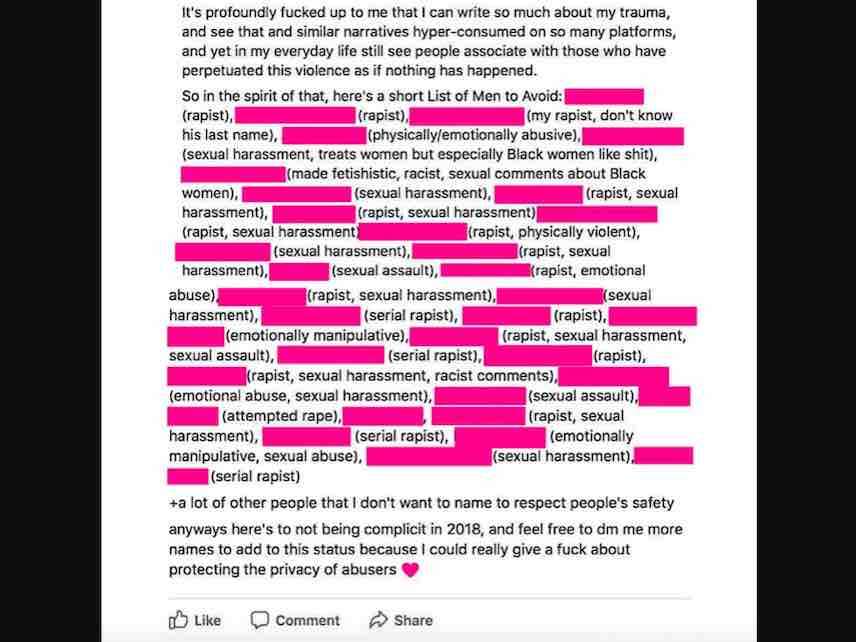Middlebury Activist Who Published List of Alleged Rapists May Have Violated Title IX
"I could really give a f**k about protecting the privacy of abusers."

Late last semester, an activist at Middlebury College publicly accused more than 30 male students of sexual harassment, rape, racism, and emotional abuse—her own version of the infamous Shitty Media Men List.
Ironically, it's that student, Elizabeth Dunn, who could be in trouble. The list may violate the sexual misconduct reporting procedures required by the college under Title IX, the federal statute that mandates gender equality in schools.
Dunn published the list on Facebook. It begins with a trigger warning for "sexual assault/abuse" and then proceeds to name 30 alleged abusers.
"So many people at middlebury [sic] are open about the trauma they've experienced here, and yet there's still reluctance to publicly name the ones who have caused this pain," she wrote. "It's profoundly fucked up to me that I can write so much about my trauma, and see that and similar narratives hyper-consumed on so many platforms and yet in my everyday life still see people associate with those who have perpetuated this violence as if nothing has happened. So in the spirit of that, here's a short List of Men to Avoid."
The names were redacted in the version of the list obtained by Inside Higher Ed. (The original post has by now been deleted.) Many are accused not just of rape but of serial rape. At the end of the post, Dunn writes: "feel free to DM me more names to add to this status because I could really give a fuck about protecting the privacy of abusers."
Middlebury administrators then stepped in to tell students that anyone wishing to make sexual misconduct accusations should follow the proper reporting protocols.
Title IX doesn't require students to report sexual misconduct—either their own or someone else's. Investigations begin when a report is made to the Title IX office, either by a victim or by someone with knowledge of an incident. The idea is that victims shouldn't feel forced to go through the Title IX process if they don't think that's for the best (although I've covered plenty of cases where someone other than the alleged victim filed a complaint, thus forcing the alleged victim's hand).
Campus employees, however, are required to report sexual misconduct when they become aware of it. This includes students who serve in official capacities, such as residential advisors. And Middlebury's sexual misconduct policy requires everyone to cooperate in investigations once they are formally underway.
"Students are required to cooperate with conduct investigations once they have been identified, by themselves or others, as having relevant information," Middlebury spokesperson Bill Burger told The Middlebury Campus.
Dunn's list may have interfered with an ongoing investigation. She told the campus paper last week that administrators communicated to her it was "highly likely" she would be facing disciplinary measures. Middlebury rules also prohibit "violation of another's privacy," and the list may run afoul of that rule too.
Dunn did not respond to a request for comment, and Burger declined to comment on any individual cases. (Federal law generally prohibits college officials from discussing matters pertaining to specific students.) It's therefore impossible to say whether Dunn is actually in trouble for making the list.
But at least one expert on campus sexual misconduct policies thinks Dunn could be in trouble for violating Title IX itself. According to Inside Higher Ed:
A list with unsubstantiated claims can be damaging for its creator, said Scott Lewis, a lawyer and partner with the NCHERM Group, a risk-management firm that works with colleges. Lewis also helped found the Association of Title IX Administrators.
The list potentially could create a hostile environment for the men named in it, which is prohibited under Title IX, Lewis said. A student in theory could be disciplined for that, Lewis said, or be sued for defamation if a false accusation cropped up in a Google search for one of the men and he was prevented from receiving a scholarship or job opportunity.
Lewis took issue with the idea of publicizing names with unproven allegations against them. Lewis noted that one man was accused of being "emotionally manipulative," but it was unclear what that truly meant. Trained investigators must look into these matters and determine what happened, he said.
If students want to help, they should take part in education around assault prevention, Lewis said.
"If you want true consequence to happen, bring it to the people who enforce the rules and investigate this—pass that information on," he said.
It strikes me as weird that Title IX has essentially been interpreted to mean that any attempt to circumvent the Title IX process is itself a violation of Title IX. This calls to mind the witch hunt against Laura Kipnis, who was accused of violating Title IX essentially for speaking and writing critically about it. Perhaps Dunn shouldn't be levelling unproven allegations against other students, but she does have a First Amendment right to speak her mind, however wrong her views might be. It's worrisome that a Title IX compliance expert thinks the law requires colleges to interpret the "hostile environment" prohibition this broadly.
In any case, no matter how stridently the vast Title IX bureaucracy insists upon the primacy of its model, the people best equipped to handle the crimes alleged in Dunn's post—repeated rape—are the police. If Middlebury really is infested with serial rapists (a claim that seems dubious, given how thoroughly the campus serial predator theory has been debunked), they need to be held accountable under the criminal justice system.


Show Comments (110)